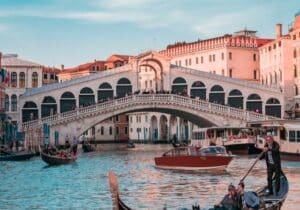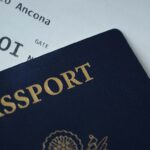The Italy Elective Residency Visa (Residenza Elettiva), also known as the Italy Retirement Visa, is a long-term visa for non-EU citizens who have sufficient financial resources and want to live in Italy without working. Sometimes called the Italy retirement visa, it is especially suited for retirees or individuals with passive income from pensions, investments, or rental properties.
This visa allows you to settle in Italy, enjoy its rich culture and lifestyle, travel freely within the Schengen Area, and eventually apply for Italian citizenship after meeting the residency requirements.
This article will explore the features of an Elective Residency Visa, the application process, requirements, the benefits of being an Italian elective residence visa holder, and more.
This is what to expect
- What is an Elective Residence Visa?
- Benefits of the Elective Residency Visa for Italy
- What are the eligibility requirements for the Elective Residence Visa?
- Italy Elective Residency Visa Required Documents
- How to Apply for the Italian Elective Residence Visa
- Italy Elective Visa Fees and Costs
- Italy Elective Residency Visa Processing Time
- Italy Elective Visa Renewal Process
- Italy Elective Visa to Italian Citizenship
- Taxes in Italy
- Other Italian Visa Options
What is the Elective Residency Visa?
The Italy Elective Residency Visa (Residenza Elettiva), also known as the Italy Retirement Visa, is a type of long-term visa that allows non-EU citizens to live in Italy without working. The Elective Residency Visa for Italy is intended for individuals or families who have reliable passive income like pensions, investment returns, rental income, or savings and want to enjoy life in Italy without needing employment or making a large investment.
Foreign nationals should not be working in their home country or Italy, as this visa strictly prohibits employment. It’s a residency solution for those who are already financially independent and do not need to work to maintain their lifestyle.
This program is especially attractive for individuals or families who want to retire in Italy without needing to invest in property or a business to obtain the visa.
Benefits of the Elective Residency Visa for Italy
- Live in Italy full-time: This visa is designed for people who genuinely want to live in Italy year-round. If you’re looking for the best places to retire in Italy, this visa allows you to establish residency by spending at least 183 days per year in the country to maintain your status.
- Visa-free travel in Europe: You can easily travel freely within the Schengen Area for up to 90 days within any 180-day period across Europe.
- EES and ETIAS exemption: Elective Residency Visa holders are exempt from both the EU’s Entry/Exit System (EES) and the upcoming ETIAS travel authorization, which will be required for most non-EU travelers.
- Access to public healthcare: You must start with private health insurance to apply, but once in Italy, you can register with the public health system (SSN) for about €2,000 per year. This gives you and your family access to high-quality medical care.
- Public education for your family: Applicants can have their children attend Italian public schools and universities, just like locals.
- Bring your family: Spouses and dependent children, including adult children with disabilities, can be included in your application through family reunification.
- Permanent residency: After living in Italy continuously for five years, you can apply for permanent residency, as long as you meet the income and residency requirements.
- Citizenship: After 10 years of legal residence, you may apply for Italian and EU citizenship. Italy allows dual citizenship, so you can usually keep your original passport.
- Tax benefits: New residents may qualify for Italy’s flat tax regime, paying a fixed amount on foreign income instead of regular tax rates, if they are living in Italy and become tax residents. This can be beneficial for high-net-worth individuals.
What are the Italy Elective Residency Visa Requirements?

To meet the requirements for the Elective Residency Visa in Italy, the applicants must:
- Be at least 18 years old.
- Have stable, sufficient financial resources to live in Italy without working.
- Applicants must have suitable accommodation in Italy, either owned or leased.
Accommodation requirements vary depending on how many applicants are included. The lease must be valid for at least one year. Hotel bookings or temporary stays are not accepted. - The applicant cannot work in Italy or remotely for a foreign company.
- Applicants must provide health insurance that covers at least €30,000 per person per year.
- Applicants must have a clean criminal record.
- Applicants must state the reason for their intention to move permanently to Italy
Financial requirements
To qualify for the Italy Elective Residence Visa, applicants must prove a steady stream of passive income. The minimum financial requirement for 2025 is:
- €32,000 per year for a single applicant.
- €38,000 per year for a married couple.
- An additional €6200 per dependent child.
Savings alone do not qualify as stable passive income, but may support the application.
Qualifying dependents
- Applicant’s spouse who lives with the applicant.
- Children under 18.
- Dependent Children over 18 who are not self-supporting due to their health conditions resulting in permanent inability to earn a living.
- Dependent parents over 65 years old, who do not have any other children in their country of origin or do have children who cannot provide support to their parents because of a serious health issue.
- You need to prove that you can financially support your dependents.
Italy Elective Residency Visa Required Documents
Within 8 days of arriving in Italy, you must register at the local Police Department (Questura) to get your “Declaration of Stay” (Permesso di Soggiorno), the official document that legalizes your stay, and you should keep copies of all documents submitted with your visa application. The Consulate General will review your documents and may ask for additional ones if needed.
Applicants must submit the following:
- Your valid passport. If you are a legal resident but not a citizen of your country, you must also bring your ID or residence permit.
- Visa Application Form: The visa application form must be fully completed and signed by the applicant at the Consulate. The applicant must appear in person to submit it.
- Two passport-style photos.
- Proof of physical residence in the consular district of your country.
- Proof of accommodation in Italy: You must have a lease agreement valid for at least one year or the title deed of a property in Italy, both in your name and covering the visa duration. Provide the original lease and proof that the landlord registered it with the Agenzia delle Entrate (Italian Tax Authority) if renting. Hospitality from others or hotel stays is not accepted. Your visa will be denied without a lease or deed in your name. If you move later, notify the Questura that issued your permit.
- Proof of substantial, continuous, and stable passive income: Provide bank statements from the last 3 months, letters from banks or financial institutions showing available funds, income, and tax return statements. Some consulates may require higher income amounts, especially if family members are included.
- Proof of no criminal record.
- Proof of health insurance: Insurance must be valid in all Schengen countries and cover at least €30,000 per person per year.
- Motivation letter: Write a letter explaining your reasons for wanting to move to Italy permanently. Everyone’s reasons are different.
All documents must be translated into Italian and officially legalized.
How to Apply for the Italian Elective Residence Visa

- Gather all the required documents and information.
- Lease or buy a property in Italy. The lease or deed must be in your name and registered with the Italian Tax Agency (Agenzia delle Entrate). The lease should be valid for at least one year.
- Apply for the Elective Residency Visa at the nearest Italian Embassy or Consulate. The visa is valid for one year and can be renewed.
- Travel to Italy before your visa expires.
- Within 8 working days of arrival, apply for your Residence Permit. This permit lasts one year and is renewable.
- Register your residence with the Italian Office of Vital Statistics (Anagrafe).
- Renew your Elective Residency Visa every year.
- After 5 years of living in Italy legally, you can apply for permanent residence.
- After 10 years of legal residence, you can apply for Italian citizenship.
When you apply for the Italian Residence Permit at the Questura, you will get a Tax ID Number (Codice Fiscale). This number is needed to deal with public offices and to access Italy’s public healthcare system (Servizio Sanitario Nazionale). Opening an Italian bank account is recommended for convenience, but is not required.
After getting your residence permit, you must register your address with the Italian Office of Vital Statistics (Anagrafe). This registration is essential to prove your stay in Italy when applying for permanent residency or citizenship.
Italy Elective Visa Fees and Costs
The Italian Elective Residence Permit application fee is €116 per person, and it must be paid in cash or money to the Italian consulate. You also need to show that you make enough money, which is normally about €32,000 for single people and €38,000 for couples annually.
Italy Elective Residency Visa Processing Time
An Italian Elective Residence Visa can take up to 90 days to process. Therefore, applying at least 90 days before the day you want to depart is best, as expedited processing is not an option.
Italy Elective Visa Renewal Process
The renewal process for the Italy Elective Residency Visa must be done at the local Questura. To retain residency, holders of the Italian Retirement Visa must reside in Italy for at least 183 days per year. You must show that you still meet the original requirements, including sufficient financial resources and valid health insurance. Applications can be submitted up to 90 days before and up to 60 days after your permit expires.
Italy Elective Visa to Italian Citizenship
You can apply for Italian citizenship after receiving an Italian Elective Residency Visa and living in Italy for ten years. You must meet additional requirements, such as having a steady income and a spotless criminal background.
Taxes in Italy
If you move to Italy on an Elective Residency Visa and become a tax resident, your worldwide income is generally subject to Italian taxes. However, you may qualify for one of two special tax regimes:
- 7% Flat Tax Regime: If you relocate to a small town (under 20,000 residents) in southern Italy or certain earthquake-affected areas, your foreign income can be taxed at a flat 7% for up to 10 years. To qualify, you must not have been an Italian tax resident in the past five years and must receive passive income or a foreign pension. This regime also exempts you from reporting foreign assets and paying wealth taxes on assets held abroad.
- €200,000 Italy Flat Tax Regime: High-net-worth individuals can choose to pay a flat €200,000 per year on all foreign income, with an option to extend to family members for €25,000 each. This regime also includes exemptions from foreign asset reporting, wealth taxes, and inheritance/gift tax. Capital gains from qualified shareholdings are taxed at 26% in the first five years unless a special tax ruling is filed.
Other Italian Visa Options
The Italy Digital Nomad Visa allows non-EU or EEA citizens to live in Italy while working remotely online for companies or clients based outside of Italy. Applicants must be skilled professionals with at least six months of experience and provide proof of a three-year university degree, a licensed profession, or a recognized qualification. They need a one-year employment contract with a foreign company or client agreements outside Italy. The Italian authorities require sufficient financial resources, including a minimum annual income of €28,000.
The Italian Golden Visa, or Investor Visa for Italy, allows non-EU citizens to live legally in Italy by making a financial investment. To qualify, you must invest a minimum of €250,000. Investment options include:
- €250,000 in an innovative Italian startup
- €500,000 in an existing Italian company
- €2 million in Italian government bonds
- €1 million as a donation to support public projects in areas like culture, education, or immigration
The visa is issued quickly, valid for two years, and can be renewed for another three years.
How Can Global Citizen Solutions Help You?
Global Citizen Solutions is a boutique investment migration consultancy firm focused on finding the right residency or citizenship by investment program for individuals wishing to secure their future and become global citizens. With offices in Portugal, the United Kingdom, Hong Kong, and Brazil, our multilingual team guides individuals and families from start to finish, providing expert advice considering freedom, mobility, taxation, and security.
- We have helped hundreds of clients from 35+ countries in all the top residency by investment and citizenship by investment programs. With an in-depth and comprehensive understanding of the area, we provide our clients with solid guidance.
- Our team has never had a case rejected. Our 100 percent approval rate sets us apart from our competitors and guarantees that you can expect a successful application.
- Our transparent pricing covers all the processes from opening your bank account, document certification, and legal due diligence to investment and submission. As there is one fee for the entire process, you can be confident that you will not face any hidden costs later.
- All data is stored within a GDPR-compliant database on a secure SSL-encrypted server. You can be safe knowing that your personal data is treated with the utmost security.
- Global Citizen Solutions provides an all-encompassing solution. Our support can continue even after you receive your passport. We offer additional services such as company incorporation, Trusts, and Foundations formation.
- The BeGlobal Onboarding System® allows you to access the status of your application every step of the way, something that sets us apart from our competitors.

Frequently Asked Questions About Italy's Elective Residency Visa
What is the Italy Elective Residency Visa?
The Elective Residency Visa for Italy is designed for non-EU citizens who want to live in Italy without working. It requires proof of a stable, passive income of at least €32,000 per year from sources like pensions, investments, or property rentals. Applicants must also show long-term accommodation in Italy. This visa is ideal for retirees or financially independent individuals.
Who is eligible for the Elective Residency Visa in Italy?
The Italy Elective Residency Visa is designed for non-EU citizens who wish to reside in Italy without engaging in employment. Applicants must be at least 18 years old and demonstrate stable passive income from sources such as pensions, investments, or rental income. Applicants must also provide proof of accommodation in Italy, valid health insurance covering at least €30,000 per year, and a clean criminal record.
What are the income requirements for the Italy Elective Residency Visa?
To get the Italy Elective Residency Visa, you need a steady passive income. The minimum is about €32,000 per year for one person and €38,000 for couples annually. For each family member, you need to add 20% more. Passive income can come from pensions, rent, or investments, but not from a job. Some consulates may ask for more money to be sure you can support yourself.
Can I switch from the ERV to a different visa while living in Italy?
Yes, but you must meet the new visa’s eligibility requirements. You may sometimes need to return to your home country to reapply.
Can I work with an Elective Residence Visa?
No, employment is not permitted, including remote work for foreign employers. However, income from property ownership or investments is allowed.
How long is the Elective Residence Visa valid?
The visa and residence permit are valid for one year and must be renewed annually. Holders must reside in Italy for at least 183 days per year.
Can I apply for permanent residency?
Yes, after five years of continuous residence, you can apply for a permanent residence permit, provided you meet financial requirements and pass an Italian language test (A2 level). Italian citizenship is possible after ten years.
Can I combine income sources to meet financial requirements?
Yes, multiple passive income sources can be combined. Savings alone do not qualify but may support the application.


